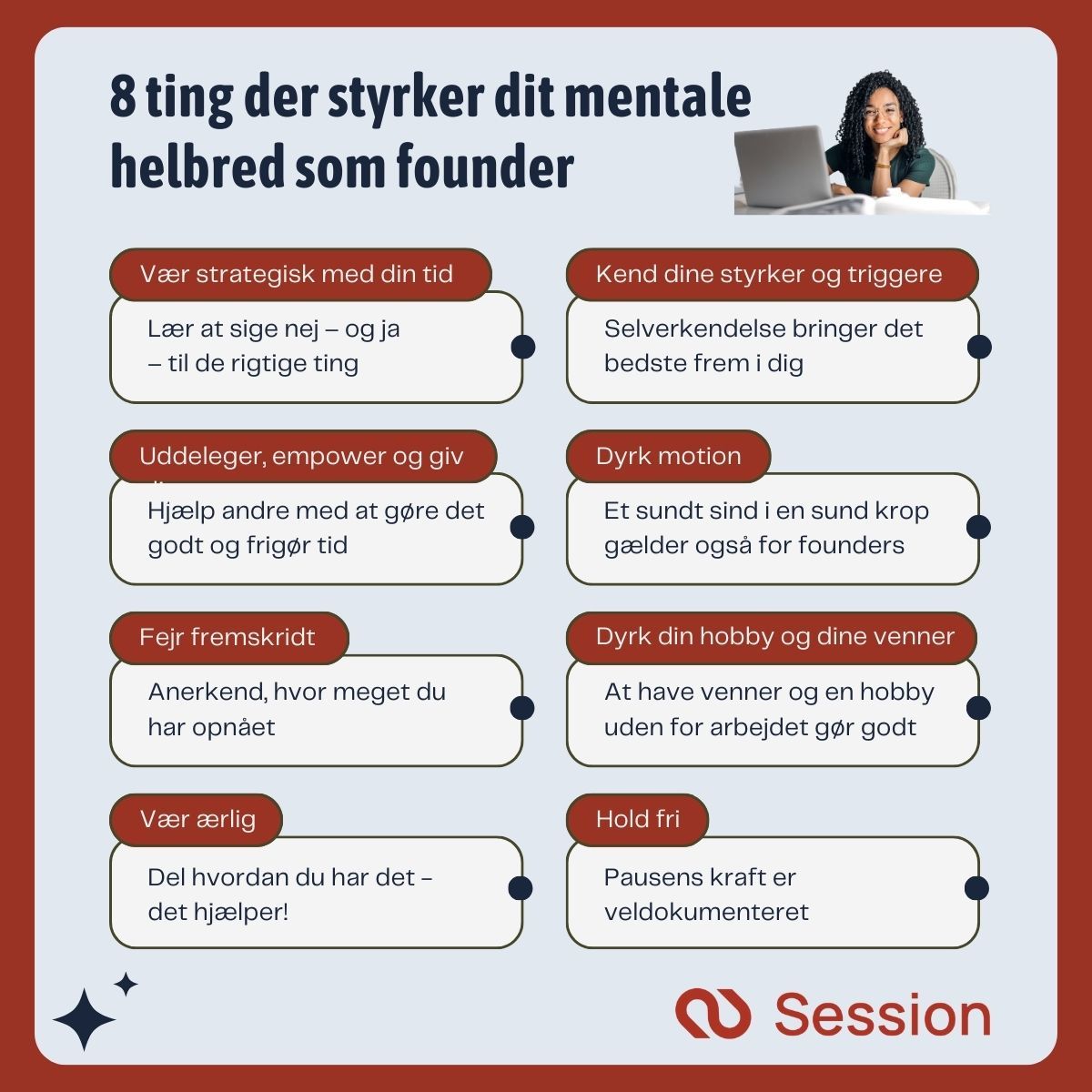Efter at jeg i mere end to årtier har rådgivet og hjulpet Startup-foundere med ikke bare at køre deres forretning fornuftigt, men også med at trives, kan jeg konstatere, at en del iværksættere kæmper med følelser af angst, ensomhed og med at opretholde en sund balance mellem arbejde og privatliv. For mange iværksættere kan Startup-livet ende med at få prioritet over alt andet og medføre en usund og uholdbar livsstil, konstant skyldfølelse, når man ikke arbejder og andre negative konsekvenser for ikke bare det mentale helbred, men også det fysiske.
Udtrykket ''de stille lidende'' beskriver desværre meget godt, hvordan mange iværksættere har det med deres mentale helbred. Selvom mental sundhed på arbejdspladsen i de senere år har fået mere opmærksomhed og ført til en mere åben samtale om hvordan vi egentlig har det, når vi går på arbejde, har vi stadig en lang vej at gå, når det kommer til at afstigmatisere mentale lidelser, især for iværksættere.
Det ekstra pres, som iværksættere står over for, såsom at få og fastholde de rigtige investorer, at kunne fastholde og betale gode medarbejdere selv under usikre vilkår for virksomheden, samt at (det føles som om) alles øjne er på en, og at man derfor ikke kan tillade sig at fejle (og hvis man gør, så gør man det med store konsekvenser for ikke bare ens egen, men også andres karriere), kan føre til ekstra mentale udfordringer for grundlæggeren. De frygter måske at miste troværdighed hos investorer og medarbejdere, hvis de ikke er ovenpå hele tiden, og det betyder ofte, at de ikke åbent viser eller taler om det, hvis de har det slemt mentalt i en periode.Det medfører så til gengæld, at stiftere ofte er alene, når de har allermest brug for andre. Denne isolation og ensomhed kan i sig selv afføde mentale problemer.

Men den gode nyhed er, at der er meget, man kan gøre for at undgå at havne i en negativ, nedadgående spiral. Man kan fx tale om hvordan man har det - med andre iværksættere.
I denne artikel ser vi nærmere på, hvorfor det er så vigtigt, at sikre iværksætteres mentale sundhed, samt ser på strategier til at fremme den mentale sundhed.
Hvorfor er mental sundhed så vigtig for iværksættere?
Opretholdelse af mental sundhed er afgørende for Startup-foundere, og afgørende for Startup’en som helhed: Stifternes mentale helbred påvirker nemlig hele teamet og virksomhedens evne til at overleve i det lange løb. At kunne holde hovedet klart samt have en sund og robust livsstil er altafgørende for stifternes velvære - men også for deres evne til at præstere. Det er efterhånden alment kendt, at præstation er knyttet til trivsel - og omvendt. Derfor er det også af interesse for investorer, at de stiftere, de investerer i, holder sig sunde og mentalt raske under hele Startup-rejsen.
Ud over ydeevne og investeringer er det også vigtigt for Startup-stiftere at holde sig sunde ud fra et helt grundlæggende alment menneskeligt perspektiv.
Alle fortjener at have det godt, at føle sig godt tilpas, udhvilede og i mentalt overskud. Mental sundhed er grundlæggende en menneskeret i sig selv.
Kort sagt, stiftere fortjener ro i sindet og mentalt velvære - ligesom alle andre gør! Og - det er muligt at gå gennem Startup rejsen uden at have det dårligt, gå ned med stress eller brænde ud! Det er et kolossalt spild, når mennesker bliver udbrændt og lider af søvnløshed, angst og depression – især når der kan gøres noget ved det!
Hvordan og hvorfor opstår udbrændthed blandt foundere?
En række undersøgelser viser, at grundlæggere ofte oplever en række psykiske problemer: 50 % oplever at have et mentalt helbredsproblem, og foundere har to gange større sandsynlighed for at lide af depression end andre ansatte. Derudover rapporterer 77 %!!!! af foundere, at det at drive en virksomhed har påvirket deres mentale sundhed negativt, og 68 %!!!! af foundere kæmper med deres søvn.Det er altså høje tal!
På trods af udbredelsen af disse problemer er mental sundhed stadig et tabubelagt emne for mange startup-stiftere. Dette skyldes sandsynligvis, at Startup-verdenen er fuld af usikkerhed, og stifterne er under pres for at formidle et billede af styrke og stabilitet overfor ansatte, kunder og investorer. Det er deres forretning, der er på spil. Men det konstant at skulle fremstå stærk, mens ydre og indre pres hober sig op, kan være mentalt udmattende – og det kan også føre til udbrændthed.
Forklaringen bag, hvorfor Startup-foundere så ofte oplever problemer med deres mentale helbred, kan både forklares med årsager i miljøet omkring founderen, samt i visse personlighedstræk, der ofte gør sig gældende blandt iværksættere.
Mange Startup-foundere har visse personlighedstræk, som kan hjælpe dem med at overleve inden for en stærkt konkurrencepræget Startup-industri. Egenskaber som at kunne være højt præsterende, fokuserede og målrettede, evnen til at glemme andre ting omkring dem (inklusive at passe på deres eget helbred og deres kære) og evnen til at gøre ekstraordinære ting, ingen andre har tænkt på eller turdet gøre er alle egenskaber, som kan hjælpe en founder til at lykkes “på trods”. Men når disse egenskaber bruges ukritisk, kan de negativt bidrage til udbrændthed og medføre en følelse af ensomhed, nedtrykthed og måske endda depression.
Med hensyn til de miljøfaktorer, der kan påvirke de mentale udfordringer hos foundere, drejer det sig bl.a. om den usikkerhed, det høje tempo samt det pres, der præger Startup miljøet generelt. Spørgsmål såsom: “Kan jeg rejse penge og betale løn? Vil folk tro på og købe vores produkt? Er andre ved at overhale os indenom uden vi har opdaget det? Kan vi nå at lave den her release som lovet? Vil kunden rate os dårligt?” Disse spørgsmål - og flere andre - medfører et følelsesmæssige pres, der stammer fra ens egne såvel som andres forventninger om at lykkes (nogle gange mod alle odds).
Heldigvis findes der måder at håndtere presset på - på en sund måde. Dem vil vi se nærmere på i det følgende afsnit.
Hvordan kan iværksættere sikre deres mentale sundhed?
Bevidstheden om, at både miljø og personlighedstræk har noget at skulle have sagt i forhold til at sikre den mentale sundhed blandt foundere, er et første skridt på vejen mod at kunne gøre noget ved det, der spiller ind i forhold til den enkelte stifters velbefindende. Hvis man ved, hvor skoen trykker, kan man også lettere gøre noget ved det. Men en ting er bevidsthed, og det personlige arbejde der derefter ligger i at håndtere f.eks. egne personlighedstræk på en måde, så de kan spille til ens fordel, snarere end stå i vejen for ens succes. Noget andet er, hvad den enkelte founder i øvrigt kan gøre, for at sikre sin mentale sundhed. Det opsummerer vi i det følgende:
- Vær strategisk med din tid og prioriter hårdt. De fleste iværksætteres kalender er fyldt til randen med møder, arrangementer og en overvældende mængde opgaver. Brug tid på at prioritere og vær strategisk omkring, hvordan du bruger din tid. Vid, at hver gang du siger ja til noget, siger du nej til noget andet. Du har kun 24 timer i døgnet. Du bliver nødt til at lære at sige nej - samt at vælge dit eget velbefindende, din familie og din fritid til! Det betyder sandsynligvis, at du, når du begynder på denne øvelse, må lære at afvise en række mennesker, som du tidligere gav din tid, men som du ved nærmere eftersyn, ikke behøver mødes med eller bruge helt så meget tid sammen med, som du måske har haft for vane. I det lange løb er det, der tæller, at du har tid nok til at kunne holde dig selv og din virksomhed og dine allervigtigste relationer i live - ikke dit behov for at glæde alle eller give andre indtryk af, at du er tilgængelig hele tiden.
- Vær ærlig om hvordan du har det. At åbne op og være ærlig overfor sig selv og andre om, hvordan man reelt har det, samt at vise en vis grad af sårbarhed, i hvert overfor dem, man er tættest på i sit liv, er en livsvigtig og meget værdifuld ting at kunne. Det, at have et sted, hvor man ærligt kan fortælle, hvordan man har det, gør underværker. Hvis man er ærlig, kan man få hjælp (og folk vil gerne hjælpe!) - men det kan også være nok, bare at få luft. At vise sårbarhed er en gave, man giver til andre. Folk, der viser sårbarhed, bliver set som mere menneskelige og behagelige at være sammen med, så vær ikke bange for, at du bliver dømt som svag, fordi du deler svære ting. Der er megen forskning, der viser, at sårbarhed ikke bliver set som et svaghedstegn, tværtimod. Når man tør stå åbent ved, hvem man reelt er og hvad man oplever og går igennem, begynder folk at se en, som et stærkt, helt menneske, som man kan stole på fordi man ikke foregiver, at tingene er lette eller at man er noget, man ikke er.
- Lær dine triggere at kende, og find ud af hvad der stresser dig. Så kan man nemlig gøre noget ved tingene, inden de løber ud af kontrol. Det, at kunne identificere og opdage de ting, der kan få en ud af balance, i tide til at man kan reagere hensigtsmæssigt, når de opstår, er måske den vigtigste lære af dem alle i forhold til at sikre ens mentale helbred som founder. Hvis man kender sine triggere og det, der stresser en, kan man nemlig forsøge at undgå de situationer, hvor stressen opstår eller triggerne løber blindt af med en - eller man kan lære at reagere bedre, når situationerne opstår. Heldet begunstiger det forberedte sind - som man siger.
- Hold fri.I ferier, weekender, aftener, i løbet af dagen, og find tiden til at slappe helt af /koble helt fra ind imellem (find din egen vej!). Pausens kraft er bevist - der er ingen argumenter imod det. Du skal lære at kunne holde fri i ny og næ, for at genvinde kræfter til den næste spurt.
- Lev et helt, sundt liv. Hvis man er for knyttet til sit arbejde, bliver arbejdet måske en alt for stor del af ens identitet. At identificere sig med sit arbejde og finde værdi gennem sit arbejde er ikke en negativ ting, vi nyder alle godt af at være passionerede omkring og engagerede i vores arbejde. Men hvis arbejdet kommer til at definere alt i forhold til, hvem man er, kan det blive et stort problem. Både i forhold til, hvis man mister sit arbejde / ens startup viser sig ikke at lykkes - men også i forhold til den angst, der kan knytte sig til bare tanken om, at man skulle fejle - for nu kommer den til at betyde nærmest alt eller intet! Derfor er det en god ide at man sørger for også at have et liv uden for arbejdet. Sørg for at pleje ikke-arbejdsrelaterede relationer, hobbyer og interesserer - så arbejdet ikke bliver det eneste, der definerer, hvem man er. Dette opbygger resiliens (anti-fragility), modstandskraft og kan i øvrigt være det, der gør, at du kan slappe af og få tankerne andre steder hen, når du skal holde fri og koble fra.
- Dyrk motion! Find en fysisk aktivitet, der føles godt for din krop! Gennem fysisk aktivitet kan vi få dårlige stress-hormoner ud af vores system og samtidigt få den gavnlige afslapningseffekt i halen på træningen. Flere undersøgelser har endvidere vist, at træning er mere effektivt end medicin mod depression og angst!
- Fejr fremskridt og sejre! Alt for ofte går vi gennem vores Startup-liv uden at lægge mærke til, hvor meget vi faktisk allerede har fået gjort eller opnået – allerede. Sæt tid af - hver dag, hver uge, hvert kvartal - til at få overblikket og fejr sejrene, store som små – det betyder virkeligt noget, ikke bare for den enkelte, men for hele teamet omkring Startup’en.
- Opbyg modstandskraft. Find måder at “komme tilbage på” efter nederlag eller modgang. Som man siger, find måder at komme op på hesten igen, helst hurtigst muligt, hvis du har fejlet og er faldet. Det er helt naturligt at fejle, især når man bygger noget for første gang. Det er derfor ekstra vigtigt, at man lærer at omfavne sig selv og de fejl, man laver undervejs, og får opbygget en vis form for robusthed - selv i virkeligt hårde modgangstider. Mind dig selv om, at "det her er bare et job" og at "ingen døde!" - lær at sige "pyt, lad os komme videre" og hjælp dig selv med at få et growth mindset, der kan hjælpe dig videre, efter nederlag..
- Lær at uddelegere og give slip. Det at stole på folk og turde tro på og lade dem bevise, at de kan levere, hjælper ikke bare Startup founderen selv, men motiverer også andre samtidigt. Det at uddelegere opgaver, og styrke andre i at levere, er en klog måde at bruge sin tid og er meget mere effektivt, end at man overanstrenger sig selv til udmattelses-punktet. Uddelegering hjælper også med at opbygge ens forretning på en bæredygtig måde, og - ikke mindst - det hjælper ens medarbejdere med at udvikle sig og tage et større ansvar i længden.
- Detox fra adrenalinsøgende adfærd. For mange iværksættere kan spændingen og suset ved Startup-livet være stærkt motiverende. Men hvis man i forvejen har tendens til at søge en høj grad af adrenalin- og dopamin-kick, skal man være ekstra opmærksom på det negativt vanedannende ved stærkt adrenelin fremkalende situationer, inklusiv usikkerheden og det hurtige tempo ved Startup livet. Det er vigtigt, at man lærer at modvirke fristelsen ved at “satse noget” så man kan få endnu et kick - også selvom der er mere sikre veje frem mod målet. Man kan bl.a.forsøge at forstå impulsen, men også hvilke skader den adrenalinsøgende adfærd har for ikke bare en selv i det lange løb, men også ens omgivelser.
- Lær dine værdier, styrker og hvad der motiverer dig at kende. Forbliv tro mod det, der driver dig, og hvem du er, og byg et team omkring dig, der kan hjælpe dig med at kompensere for dine svagheder. Lav feks journaling så du kan blive klogere på, hvad der virkeligt betyder noget for dig, og hvor du henter din bedste energi.
- Øv dig i self-compassion og mindfulness meditation - herunder hvordan du kan lukke tanker ude og lære at tale venligt og roligt til dig selv, også under pres. Øv dig i at være i nuet, fx gennem meditationsøvelser, eller ved at du giver dig selv lidt ekstra tid om morgenen til bare at ''være' eller sætte din intention for dagen. Du kan også overveje at gøre mindfulness til en del af din praksis med dine kolleger, da denne måde at gribe arbejdet an på sænker stress og øger produktiviteten og velværet for alle i virksomheden.
- Brug tid i naturen og øv dig i at tage helikopterperspektivet. Se ud i horisonten - løft dit åsyn, se det store billede. Naturen kan være med til at give dig overblikket, og bringe ro til krop og sind. Gå ud i naturen, træk den friske luft ind, lad træernes blade viske dig i øret, hvad der vil være godt at gøre lige nu og her, og se dig selv i det store billede af det, naturen kan lære dig.
Hvad kan investorer gøre for at sikre iværksætteres mentale sundhed?
De gode råd, nævnt ovenfor, er alle sammen råd, der kan være med til at sikre iværksætteres mentale sundhed, hvis iværksætterne på egen hånd følger dem. Men, sammen er vi stærkere, som vi ved, og derfor er der også et vigtigt perspektiv at hente ved at se på, hvad investorer og andre omkring iværksætterne kan gøre, for at sikre deres mentale sundhed og helbred.
På makroniveau kan investorer bidrage til at forbedre iværksætteres mentale sundhed ved at gøre det legitimt for founderne åbent og ærligt at fortælle, hvordan de har det og hvilke udfordringer, de oplever på rejsen Investorerne kan hjælpe med at afstigmatisere mental sundhed. De kan f.eks. skrive under på denne “Investor Pledge”, hvilket sender et stærkt signal til iværksætterne om, at det er OK for dem åbent at tale om deres psykiske problemer og udfordringer.
Investorer, der aktivt hjælper iværksættere med at forblive mentalt sunde ved at tilbyde dem programmer, der kan hjælpe dem med at forstå sig selv bedre og tale med andre foundere om, hvordan de har det, (som de f.eks. gør i Preseed Ventures og i byFounders) - går forrest og viser vejen for andre her. Kæmpe shoutout til dem!
Hvordan kan Erhvervscoaching hjælpe foundere?
Som jeg tidligere har nævnt, kan foundere ofte opleve at være ensomme og mentalt udfordrede, uden at de nødvendigvis råber højt om det. Selvom det hjælper at tale med f.eks. kolleger, partnere og/eller venner, er virkeligheden ofte, at Startup foundere ofte føler sig alene, ensomme eller misforståede netop fordi disse mennesker, hvorend de gerne vil, ikke fuldstændigt forstår, hvad man egentlig går igennem som entreprenør. Christina Richardson (iværksætter og Startup-coach) så i 2019 nærmere på hundredvis af founderes mentale sundhed, og i forbindelse med dette berettede hun, at "hver enkelt founder brugte ordet ensom til at beskrive deres mentale situation".
Coaching kan være et fantastisk middel mod denne følelse af grundlæggerens ensomhed og isolation, særligt hvis man kombinerer det med programmer, hvor man mødes med andre Startup-stiftere og kan snakke tingene igennem. Coaching kan være det, der gør, at iværksætteren kan holde sammen på sig selv gennem de mest udfordrende øjeblikke.
"En startups sundhed og succes afhænger i høj grad af sundheden og successen hos dens grundlægger - og hele teamet - uanset hvor god man så er til sit job - kan blive bedre med en coach." siger Petrides.
Professionel erhvervscoaching kan hjælpe iværksætteren med at holde sig på sporet, bringe sine styrker i spil og få et udefra kommende syn på dilemmaer og spørgsmål, som det kan være svært at dele med og stille andre. Tag fat i os hvis du gerne vil vide mere om, hvordan erhvervscoaching måske kan hjælpe dig som Startup founder - til at trives bedre, lykkes med det, du sætter dig for, til at engagere dit team omkring dig og i det hele taget med at bygge din forretning op på en sund og bæredygtig måde.
Konklusion
Iværksætteres mentale sundhed er ikke kun vigtig for iværksætterens præstation, trivsel og succes – men for hele forretningens succes. Vi bliver nødt til at humanisere oplevelsen af at være iværksætter – og give den støtte, der skal til, for at man kan trives (og dermed præstere) som grundlægger også i det lange løb. Dette er afgørende for ikke blot iværksætteren selv at forstå, men også for investorerne bag virksomheden.
Iværksætterne kan selv gøre meget for at passe på deres mentale sundhed. Men investorerne kan også støtte dem, og iværksætterne kan få meget ud af at få deres egen erhvervscoach, der kan give dem et udefrakommende blik på, hvad der skal til, for at de kan trives og bygge en sund forretning.
Jeg håber, at vi med denne artikel kan være med til at afstigmatisere iværksætteres mentale udfordringer, så vi kan få åbnet op for en mere ærlig dialog om emnet, og gerne også støtteforanstaltninger rundt om iværksætterne, så de kan få den bedst mulige mentale støtte gennem hele Startup rejsen.














